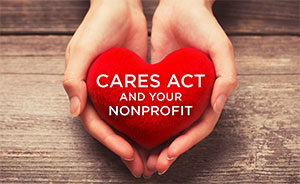5 ways the CARES Act can help your nonprofit
 For nonprofits struggling to stay afloat and pay staff amid the COVID-19-induced economic shutdown, the recently enacted Coronavirus Aid, Relief and Economic Security (CARES) Act provides needed relief.
For nonprofits struggling to stay afloat and pay staff amid the COVID-19-induced economic shutdown, the recently enacted Coronavirus Aid, Relief and Economic Security (CARES) Act provides needed relief.
From reimbursing nonprofits for employee payroll and healthcare costs to helping with unemployment cost, the CARES Act assists in the following five key ways:
1. Paycheck Protection Program
Helping small employers and their employees was a primary goal of lawmakers, and the Paycheck Protection Program accomplishes this by a mix of free money and low-interest loans for organizations that keep workers on the payroll.
Options available under the Small Business Administration-managed program depends on how many employees you have.
500 or fewer employees
- The nonprofit was in operation at least since March 1, 2020.
- Loans of up to $10 million that do not require a personal guarantee or collateral for nonprofit applicants.
- The loans are forgivable – essentially turning them into a grant – if the nonprofit retains staff between March 1 and June 30.
- 501(c)3’s may use the money for:
- Payroll costs.
- Costs related to the continuation of group health care benefits during periods of paid sick, medical or family leave, and insurance premiums.
- Employee salaries, commissions and similar compensation.
- Payments of interest on a mortgage obligation.
- Rent.
- Utilities.
- Interest on certain other debt obligations.
More than 500 employees
Under this program, the loans are not forgivable, but the interest rate is capped at 2 percent and interest accrual and repayment are suspended for the first six months. Nonprofits that accept a loan must retain or re-hire at least 90 percent of its employee complement at full compensation.
Note: Loans for payroll do not cover:
- Compensation to an individual employee with annual salaries exceeding $100,000 as prorated between Feb. 15 through June 30.
- Qualified sick leave or family leave wages if a credit under the Families First Coronavirus Response Act was already applied.
2. Economic Injury Disaster Loans (EIDL)
EIDLs are also available through the SBA, and nonprofits may apply for a loan of up to $2 million at an interest rate of 2.75 percent.
- Emergency $10,000 loan: Nonprofits with 500 or fewer employees that apply for an EIDL can receive a $10,000 emergency advance. Even if the loan application gets denied, the nonprofit does not need to repay the emergency advance.
3. Employee Retention Payroll Tax Credit
Nonprofits that either closed or suspended operations — or experienced at least a 50 percent reduction in revenue in the first quarter of 2020 compared to the first quarter of 2019 — are eligible for an employee-based tax credit.
NOTE: Nonprofits that are already receiving a payroll protection loan are not eligible for the credit.
In calculating revenue decline to determine eligibility for the payroll tax credit, organizations must take their whole operations into account.
Nonprofits that qualify:
- Are eligible for a one-year credit of up to $5,000 for each employee on its payroll between March 13 and December 31, 2020.
- The credit would remain available each quarter until revenue exceeds 80 percent of the same quarter in 2019
4. Delayed payment of payroll taxes
If a nonprofit has not gotten a Paycheck Protection Loan forgiven, the CARES Act allows the organization to delay paying the employer portion of its 2020 payroll taxes over the next two years, with equal halves due at the end of 2021 and 2022.
5. Unemployment costs for self-funded plans
The CARES Act increased unemployment aid to laid-off workers by $600 per week for four months. (This is in addition to previous enhancements made to state unemployment compensation.)
Under the CARES Act, self funded nonprofits can get reimbursement for half of the cost of the unemployment benefits paid laid-off workers.
Moving forward
As with any new legislation, the devil is in the details, and the CARES Act is no different. Over the coming weeks and months, additional regulations will get written that further define how businesses and nonprofits can take advantage of the Act’s protections.
The tax experts and Boyer & Ritter are carefully examining all aspects of the new legislation. They are ready to work with you to ensure your nonprofit fully benefits from the CARES Act and any other changes made by federal or state governments during this fast-moving situation.
David J. Manbeck is a Principal at Boyer & Ritter LLC and co-chairs the firm’s Not-For-Profit Services Group. Contact David at 717-761-7210 or dmanbeck@cpabr.com



